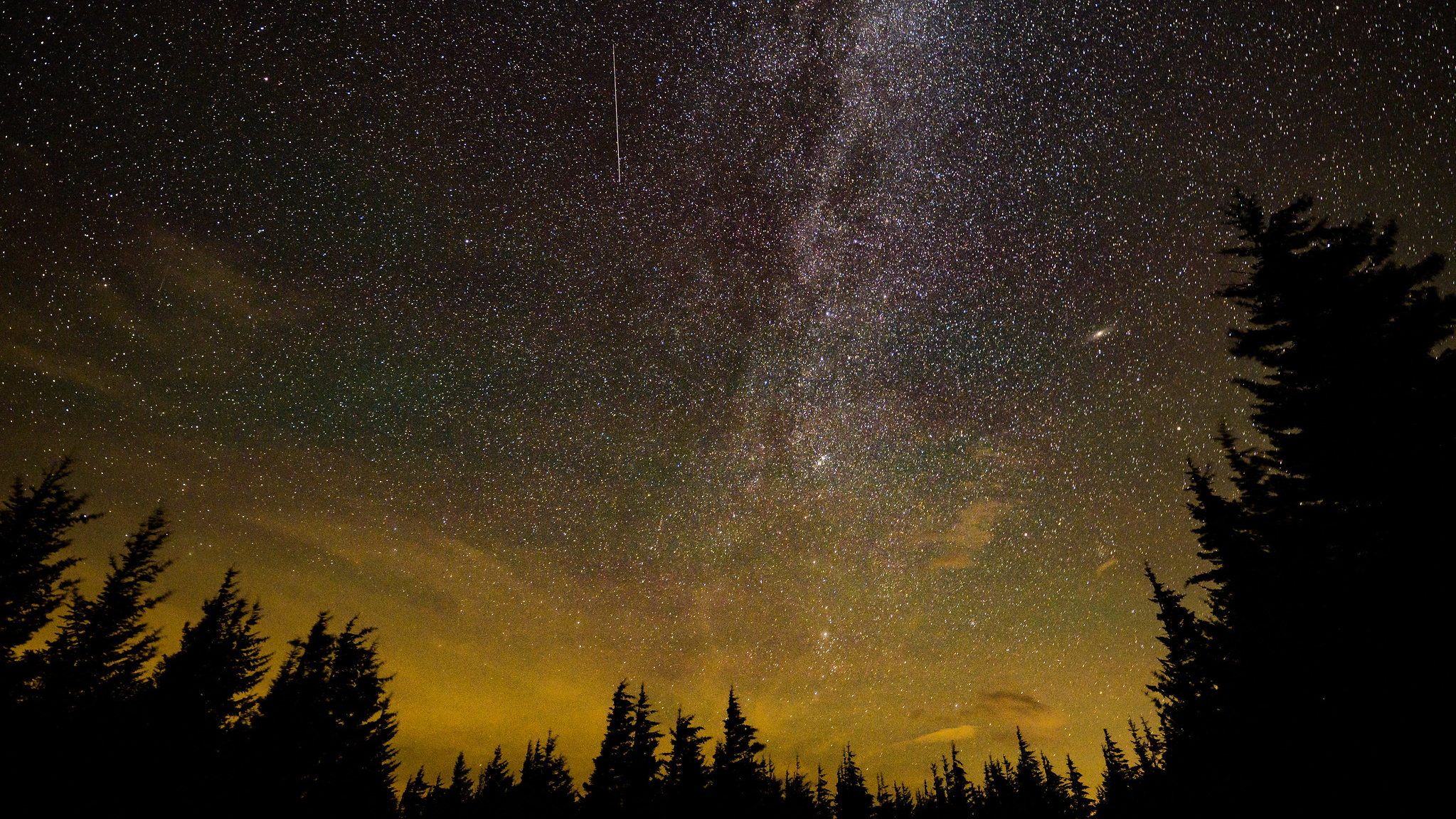Perseid meteor shower 2021 webcasts: How to watch the 'shooting stars' at their peak live tonight
If you aren't able to go outside and enjoy the annual Perseid meteor shower at its peak tonight, or you want to learn more about the science of shooting stars, there are lots of webcasts coming to tell you more.

If you take a cool photo of the 2021 Perseid meteor shower let us know! You can send images and comments to spacephotos@space.com.
The Perseids happen each year in August and are expected to reach their peak this year between Aug. 11 to 13 (Wednesday to Friday), with the best viewing hours between midnight and dawn on Thursday (Aug. 12), according to NASA. That means the peak is overnight tonight.
Earth is passing through the stream of Comet Swift-Tuttle just as a crescent moon is lighting the sky. Just a few days past the new moon, which arrived Sunday (Aug. 8), the absence of bright moonlight in the night sky will provide almost ideal conditions to catch these cometary crumbs as they slam into our atmosphere, causing the fragments to glow dramatically as "shooting stars."
Amazing Pics: Stunning Perseid meteor shower 2021 photos by stargazers
Related: Perseid meteor shower 2021: When, where & how to see it
Below is a selection of the live webcasts where you can watch the Perseid meteor shower online this week, featuring telescope views from NASA and others around the world.
The Virtual Telescope Project
Aug. 11 at 8 p.m. EDT (0000 Aug. 12 GMT)
The Virtual Telescope Project, which is based near Rome, Italy, will run a livestream starting at 8 p.m. EDT Wednesday (0000 or midnight GMT Thursday). "We will broadcast the meteor shower live, online, for free," the website stated on its event page. "We will share the view of our wide field cameras, to show any potential meteor they will capture."
Get the Space.com Newsletter
Breaking space news, the latest updates on rocket launches, skywatching events and more!
McDonald Observatory
Aug. 11 at 10:45-11:45 p.m. EDT (0245-0345 Aug. 12 GMT)
The University of Texas at Austin's McDonald Observatory in Fort Davis, Texas plans a short livestream between 10:45 p.m. EDT and 11:45 p.m. EDT Wednesday (0245 and 0345 GMT Thursday.) "In addition to live views, we will discuss the origins of meteor showers, their relationship with comets, and much more," the event's YouTube page stated. "Moderators in the live chat will be taking questions, and the host will take more at the end."
NASA Marshall Space Flight Center
Starts: Aug. 11 at 11 p.m. EDT (0300 Aug. 12 GMT)
Ends: Aug. 12 at 6 a.m. EDT (0300-1000 GMT)
The Meteoroid Environment Office at NASA's Marshall Space Flight Center in Huntsville, Alabama will stream live Perseid views from its skywatching cameras between 11 p.m. EDT Wednesday and 6 a.m. EDT Thursday (0400-1000 GMT Thursday).
The center said that viewers have the choice of dropping in or remaining online throughout the show. "Stick around, or check back in when you can," NASA officials wrote on the Facebook event page. "If skies are cloudy, we'll reschedule for the night of August 12."
Once the webcast becomes available, you can watch it live here in the window above, courtesy of NASA. You can also tune in via NASA Marshall's Facebook, Twitter and YouTube pages. (In the meantime, you can watch this new video of early Perseid meteors captured by NASA's All-sky Fireball Network.)
Lowell Observatory
Aug. 12 at 12-1 a.m. EDT (0400-0500 GMT)
The Lowell Observatory in Flagstaff, Arizona — the place where Pluto was famously discovered — will start a livestream at 12 a.m. EDT Thursday (0500 GMT) to hunt down meteors as the skies get dark. Research assistant Megan Gialluca will host the live broadcast.
"We'll use the All-Sky Camera at the Lowell Discovery Telescope to hunt for meteors together," the observatory stated on the livestream page. "After that, you'll be ready to find more on your own, when the meteor showers peak in the hours before dawn."
Kopernik Observatory
Aug. 12 at 9:30 p.m. EDT (0130 Aug. 13 GMT)
The Kopernik Observatory in Vestal, New York (just outside of Binghamton) plans a virtual observing session starting at 9:30 p.m. EDT Thursday (0130 GMT Friday). "Our livestream astronomer, Jeremy Cartie, will be available for commentary and questions," officials stated on the YouTube page, adding, "with the recent new moon, the only thing standing in our way of a great show is the weather."
Follow Elizabeth Howell on Twitter @howellspace. Follow us on Twitter @Spacedotcom and on Facebook.
Join our Space Forums to keep talking space on the latest missions, night sky and more! And if you have a news tip, correction or comment, let us know at: community@space.com.

Elizabeth Howell (she/her), Ph.D., was a staff writer in the spaceflight channel between 2022 and 2024 specializing in Canadian space news. She was contributing writer for Space.com for 10 years from 2012 to 2024. Elizabeth's reporting includes multiple exclusives with the White House, leading world coverage about a lost-and-found space tomato on the International Space Station, witnessing five human spaceflight launches on two continents, flying parabolic, working inside a spacesuit, and participating in a simulated Mars mission. Her latest book, "Why Am I Taller?" (ECW Press, 2022) is co-written with astronaut Dave Williams.









